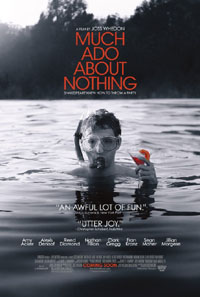 MUCH ADO ABOUT NOTHING
MUCH ADO ABOUT NOTHING(PG-13)
*** (out of 5)
June 7, 2013
STARRING
Amy Acker as BEATRICE
Alexis Denisof as BENEDICK
Nathan Fillion as DOGBERRY
Clark Gregg as LEONATO
Reed Diamond as DON PEDRO
Fran Kranz as CLAUDIO
Jillian Morgese as HERO
Studio: Roadside Attractions
Directed by: Joss Whedon
BY KEVIN CARR
Listen to Kevin’s radio review…
Ironically, I find myself somewhat at a loss for words when it comes to Joss Whedon’s microbudget adaptation of one of the most famous tales ever written. I’m not a Shakespeare aficionado (I haven’t seen too many of the films based on his plays, and I’ve seen fewer stage productions of them), but I can appreciate the work.
So bear with me if what I end up saying is utter nonsense and comes across as irrelevant, uneducated and completely off-base.
“Much Ado About Nothing” has stood the test of time as a piece of entertainment fiction. Its core themes of love and conflict are universal and still relevant today. Scenes can be shortened or removed for flow and pacing, but whatever makes it on the screen is sound. The key, at least in my relatively ignorant view of the Bard’s work, is how the story is presented.
Whedon came off the wildly successful summer tent-pole release of “The Avengers” to make this almost alarmingly minimalistic adaptation of “Much Ado About Nothing.” In this sense, I respect the hell out of him for it, regardless of how things turned out. While I’ve never been a fan of his work prior to 2012, I appreciate the fact that he dialed things back rather than just getting bigger and bigger with his career. (Though this is not unheard of. For example, after Richard Donner’s relationship with the producers of the “Superman” films fizzled, his next project was something deliberately more modest.)
Whedon casts his film with his friends and close colleagues. Anyone who has watched even a couple episodes of his television shows will recognize many faces. In this sense, “Much Ado About Nothing” feels more like a presentation from a tight-knit, well-polished community theater troupe rather than a group of Hollywood types trying to make a buck. Again, regardless of the outcome, this is to be admired.
The drawback to using Whedon’s stable of actors is that they have been drawn into his inner circle more for their ability to deliver his own dialogue and writing. Sure, they work well together, making things smooth in the production, but they aren’t Shakespearean actors. As I have stated above, the film is well polished, but it’s not necessarily honed. The acting isn’t bad; it’s just not what one might have come to expect for such a piece of work.
Still, this will touch and excite Joss Whedon’s fan base. It’s his first high-profile journey into the works of William Shakespeare, and in that sense it’s a good start.
The production feels restrained, which works to the film’s advantage at times, but works against it at other times. Grandeur is lost, and the decision to present the film in black-and-white becomes more distracting and dull than artistic.
Using homes as locations and minimal props, “Much Ado About Nothing” has a feel of a Dogme 95 film (aside from the black-and-white look, of course). Having a background in filmmaking makes me appreciate the movie in this sense, and when all was said and done, I respected this version more than I necessarily enjoyed it.
In the end, my biggest hurdle (and this is all on my shoulders, no Whedon’s) is that it’s very difficult to divorce my feelings from Kenneth Branagh’s exceptional and superior version of the story from twenty years ago. Whedon makes this movie his own and makes some starkly different choices, which makes the film worth watching. However, that 1993 spectacle film is so hard to top… or even come close to.
Podcast: Play in new window | Download
